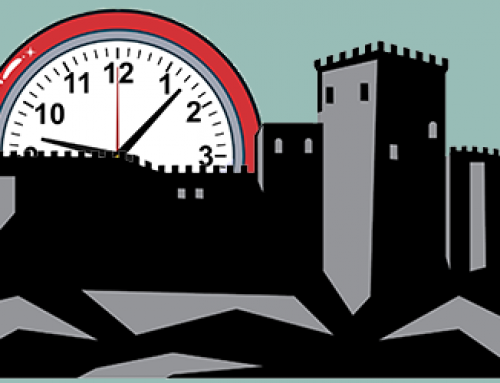A team isn’t a group of people who work together, it’s a group of people who trust each other.
 Have you ever managed people who didn’t trust one another? If you have, then you’ll know how challenging and draining that can be.
Have you ever managed people who didn’t trust one another? If you have, then you’ll know how challenging and draining that can be.
A team without trust isn’t really a team: it’s just a group of individuals, working together, often making disappointing progress. They may not share information, they might battle over rights and responsibilities, and they may not cooperate with one another.
It doesn’t matter how capable or talented your people are, they may never reach their full potential if trust isn’t present.
However, when trust is in place, each individual in the team becomes stronger, because they’re part of an effective, cohesive group. When people trust one another, the group can achieve truly meaningful goals.
In high-trust environments, people show up and to do their best work.
They’re proud to be a part of the team and are motivated to produce results. They feel confident in themselves and each other. They know what’s expected of them and what they can expect in return. They don’t hold back. They think out-of-the-box, and are willing to take prudent risks.
They know they don’t need to look over their shoulders, so instead they look to each other, and together they look ahead. They create and innovate and know that, if they make a mistake, their team members will support them and that all can learn and grow from that mistake. They freely share information, collaborate, and leverage one another’s skills and abilities productively.
Trust builds the bridge between the business need for results and the human need for connection.
Businesses need their people to put forth their best effort, to collaborate and to produce good results by working effectively and efficiently. Those people have a need to be able to connect with one another—to be seen, heard, and understood. Trust builds the bridge between the business need for results and the human need for connection.
There are no words more important than trust. In any organization, trust must be developed among every member of the team if success is going to be achieved.
When trust is compromised or not created, people become withdrawn and disengaged.
Their confidence in themselves and in others erodes, along with their commitment to their work and their organization. They wonder, “Do I belong here?” Confidence is overshadowed by doubt: “Do I have what it takes?” Commitment dwindles: “Is this the place for me?”
Without trust, people struggle to bring their best forward.
Collaboration and productivity suffer. The lowest common denominator becomes the norm. The whole environment is weakened, with everything becoming harder and taking longer.
Here are some ideas about how to build trust in your team:
Talk about fear and trust as business topics.
This is the hardest step to take. We’ve been trained not to talk about our fears. If there’s a high level of fear in your organization already, employees may bite their lips rather than tell the truth about your toxic culture even when the topic appears on a meeting agenda.
Trust is the glue of life. It’s the most essential ingredient in effective communication. It’s the foundational principle that holds all relationships.
Step away from the philosophy of blaming and shaming employees for mistakes.
Every mistake is a learning opportunity. If you track your employees’ mistakes but say nothing about their triumphs, you are begging for the best people to leave and only the most fearful ones to stay.
Review your employee handbook and policies.
Most organizations have way too many picky rules and punishments embedded in their cultures by way of the employee handbook. Your employees are not wayward children. They’re qualified, creative adults and value creators. Honor them, and don’t pester them with grade school rules.
The ability to establish, grow, extend, and restore trust in the key professional and personal competency of our time.
Get your executives in front of employees as often as possible and in the most informal settings you can arrange.
Tell your CEO and VPs to show up at department meetings so they can meet and mingle with your employees in every function. Get them out among the people who report to them.
Value your employees as people more than you value them as production units.
You get to show how much you value your employees every day, in a thousand ways. When you make human decisions instead of mechanical ones based only on dollars and cents or “operational efficiency,” people notice.
Model appropriate leadership and get your fellow leaders to do the same thing.
Too many managers look at “the employees” as a bloc and seldom think about the individual people they supervise, or their needs or challenges. Real leaders are intently focused on the people who report to them and the energy on the team. Every leader can develop that same focus. You can support one another in the journey!
Admit when the company makes mistakes, or when you personally make a mistake.
Use a human voice in your communications with employees.
Get rid of the terse, governmental jargon used too often in business communications, and address your employees as the brilliant human beings they are.
Constantly ask your employees how they’re doing, what they think and what they’d like to see at work.
Don’t do it through an anonymous survey. When you have to promise anonymity to get honest answers from your employees, you’ve already lost the war between fear and trust.
Be honest with employees.
The more visibility your employees can get into the future—and their own futures with your firm—the better. The more they know about the organization’s plans, priorities, challenges, and opportunities the more in sync they will be with the leadership team.







